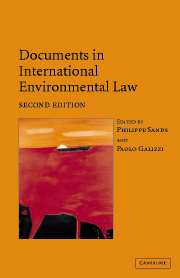Book contents
- Frontmatter
- Contents
- Preface
- PART I General instruments
- PART II Atmosphere
- PART III Oceans: global
- PART IIIB Oceans: regional
- PART IV Freshwater resources
- PART V Biodiversity
- PART VIA Hazardous substances and activities: nuclear
- PART VIB Hazardous substances and activities: pesticides
- PART VIC Hazardous substances and activities: waste
- PART VII Human rights and the environment
- PART VIII War and the environment
- PART IX Trade and the environment
- PART X Environmental impact assessment and access to information
- PART XI Liability for environmental damage and breaches of environmental obligations
- PART XII The Antarctic
- 47 Antarctic Treaty, 1 December 1959
- 47A Protocol on Environmental Protection to the Antarctic Treaty, 4 October 1991
- 48 Convention for the Conservation of Antarctic Seals, 1 June 1972
47 - Antarctic Treaty, 1 December 1959
Published online by Cambridge University Press: 05 June 2012
- Frontmatter
- Contents
- Preface
- PART I General instruments
- PART II Atmosphere
- PART III Oceans: global
- PART IIIB Oceans: regional
- PART IV Freshwater resources
- PART V Biodiversity
- PART VIA Hazardous substances and activities: nuclear
- PART VIB Hazardous substances and activities: pesticides
- PART VIC Hazardous substances and activities: waste
- PART VII Human rights and the environment
- PART VIII War and the environment
- PART IX Trade and the environment
- PART X Environmental impact assessment and access to information
- PART XI Liability for environmental damage and breaches of environmental obligations
- PART XII The Antarctic
- 47 Antarctic Treaty, 1 December 1959
- 47A Protocol on Environmental Protection to the Antarctic Treaty, 4 October 1991
- 48 Convention for the Conservation of Antarctic Seals, 1 June 1972
Summary
Editorial note
The primary objective of the Antarctic Treaty is to ensure that only activities for peaceful purposes take place in the Antarctic (Article I). In addition, the Treaty seeks to promote scientific research and co-operation among the Parties (Articles II and III). The Treaty does not confirm or deny the claims by several States to territorial sovereignty and other rights in the Antarctic (Article IV) and does not affect the rights under international law of States in respect of the high seas within the Antarctica region (Article VI). Nuclear explosions and the disposal of radioactive waste in the Antarctic are prohibited, subject to the conclusion of an international agreement on nuclear energy by the Consultative Parties (Article V). The Consultative Parties are those who are either named in the Preamble or who become so designated by conducting ‘substantial scientific research’ in the region (Article IX).
An inspection system is established (Article VII). The Treaty requires representatives of the Consultative Parties to meet at ‘suitable intervals’ to consult on matters relating to the Antarctic, including the preservation and conservation of living resources (Article IX(1)). The Treaty provides for the submission on consent of any dispute to the ICJ, but failure to agree on a reference to the ICJ does not relieve Parties of their obligations to settle the dispute by other peaceful means (Article XI). Amendments require the unanimous agreement of the Consultative Parties and enter into force when all have ratified them (Article XII(1)(a)).
- Type
- Chapter
- Information
- Documents in International Environmental Law , pp. 1305 - 1312Publisher: Cambridge University PressPrint publication year: 2004



